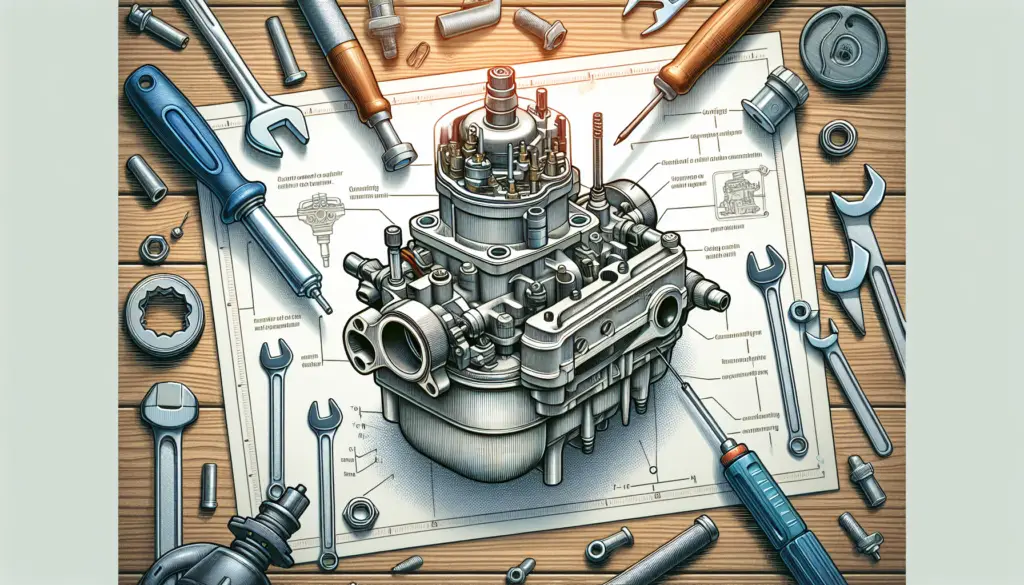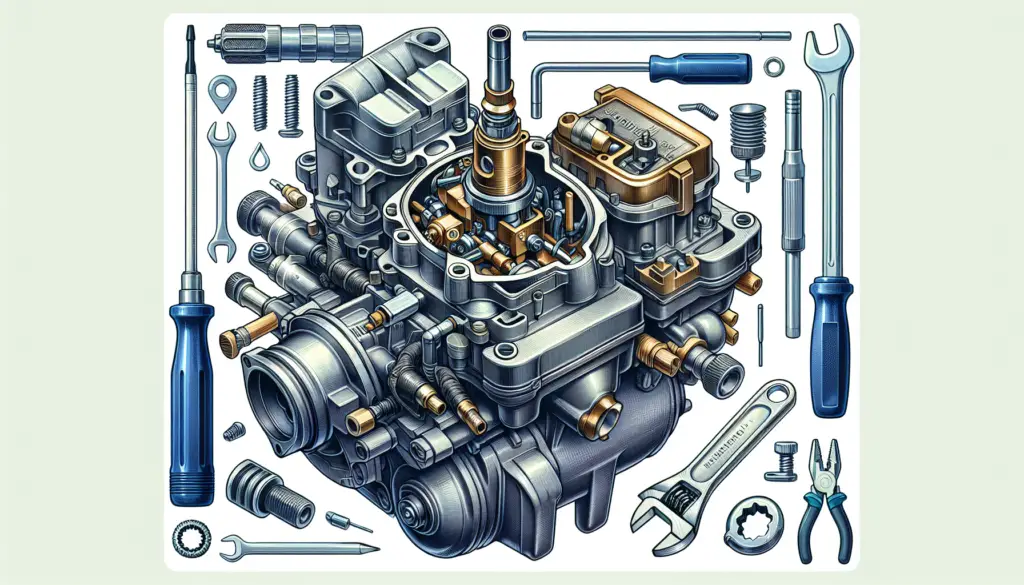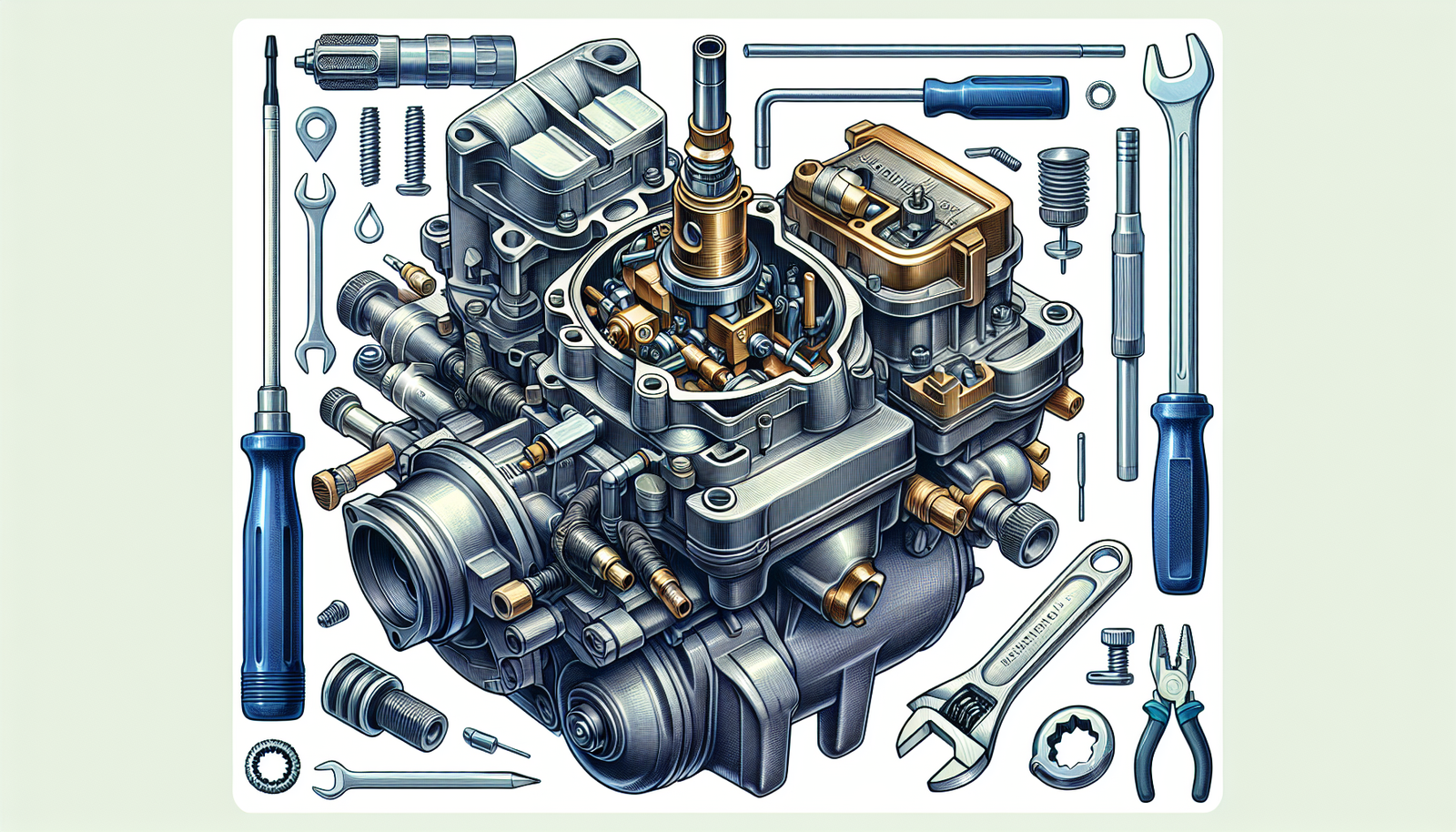As you navigate the open waters, the last thing you want is to face engine trouble, especially with something as crucial as your boat’s carburetor. In this detailed guide titled “Common Boat Engine Carburetor Issues And Solutions”, we’re handing you an informational lifesaver that will help you understand the issues that might arise with your boat’s carburetor and how to solve them. So let’s set sail together into a world nested in the heart of your boat – the engine, where the knowledge of common carburetor problems could prove to be as vital as knowing how to steer your vessel.

Understanding the Boat Engine Carburetor
The carburetor is a vital part of your boat engine that you need to understand to ensure smooth sailing. It’s the component that mixes fuel and air to create a highly combustible mixture that powers your boat. We’ll explore more about its function, components, and how it works in the next sections.
Functions of the Carburetor
The carburetor essentially serves three primary functions. First, it measures the amount of air entering the engine and combines it with the right amount of fuel to create an optimal fuel/air mixture for combustion. Second, it helps maintain the engine’s speed and prevent the overloading of essential components. Lastly, the carburetor controls the airflow into the engine during idle, helping maintain a steady engine speed when your boat is stationary.
Components of the Carburetor
The carburetor is made up of several components, all of which play a vital role in its overall function. Key components include the throttle plate (which controls the amount of air and fuel flow), the float (which keeps the fuel at a constant level), the jets (which regulate the amount of fuel mixed with the air), and the venturi (which speeds up the air entering the carburetor).
How a Boat Engine Carburetor Works
Here’s how the magic happens: When you start your boat’s engine, air flows into the carburetor where it is speeded up through the venturi. As the air is accelerated, it causes fuel to be drawn in through the jets, combining it with air. This fuel-air mixture is then sent into the engine’s cylinders where it gets ignited by the spark plugs to produce power for your boat.
Signs of Boat Engine Carburetor Problems
Carburetor issues can happen even with regular maintenance. But don’t worry! Recognising the signs early can help you solve these problems right away. Let’s discuss some signs to watch out for.
Decreased Engine Performance
A usually smooth-running boat engine that suddenly starts to perform poorly might be suffering from carburetor issues. You might notice that it struggles to reach optimal speeds or has poor acceleration – a clear sign that something could be wrong.
Difficulty Starting the Engine
If you’re having trouble starting your boat’s engine or it frequently stalls, this might point towards a carburetor problem. This is because a faulty carburetor may not provide enough fuel to the ignition system.
Unusual Noises from the Engine
If you’re hearing strange noises coming from your engine bays, such as backfiring or popping sounds, these could be signs of a faulty carburetor. Faulty carburetors may supply too much or too little fuel, causing these noises during combustion.
Increased Fuel Consumption
Are you needing to fuel up more often? A faulty carburetor may deliver too much fuel into the engine, leading to excessive fuel consumption and reduced efficiency.
Common Boat Engine Carburetor Issues
Understanding the common problems that can afflict your carburetor can be incredibly beneficial. Below, we’ll talk about some typical issues.
Dirty Carburetor
Your carburetor, like any part of your boat, can become dirty. Dirt, grime, or gunk can build up over time and affect the carburetor’s performance.
Warped Carburetor
Due to continued pressure and heat exposure, the carburetor can get warped or bent out of shape over time. This warp may prevent your carburetor from functioning optimally.
Clogged Carburetor Jets
Similar to a dirty carburetor, the jets can also become clogged due to foreign particles. This can obstruct the flow of fuel into the engine.
Boat Engine Overheating
An improperly functioning carburetor can lead to your engine overheating. This occurs when the mixture of air and fuel becomes too lean, causing the engine to run hotter than normal.
Sudden Engine Cut-out
In extreme cases, a faulty carburetor can cause your engine to cut out entirely without warning. This can be caused by several issues, including a fuel mixture that is too rich or too lean.

Dirty Boat Engine Carburetor
No one likes dealing with a dirty carburetor. However, being aware of the symptoms, causes, and how to clean a dirty carburetor can save you from a bad day on the water.
Symptoms of a Dirty Carburetor
A dirty carburetor may lead to the boat struggling to stay idle or accelerating poorly. You might also experience recurring engine stalling or observe black, sooty smoke emitting from the exhaust.
Causes of Carburetor Dirt Accumulation
Dirt can accumulate due to many factors. Poor-quality fuel, improper maintenance, and even dust in the air can lead to dirt buildup. Regular cleaning and maintenance can help prevent this issue.
Cleaning the Carburetor
Cleaning a dirty carburetor involves removing it from the engine, disassembling it, and cleaning each component with a carburetor cleaning solution or spray. Always take care to reassemble it correctly and reconnect it securely.
Warped Boat Engine Carburetor
A warped carburetor can greatly affect your boat’s performance. Understanding the signs and how to fix them can make your boat trip much more enjoyable.
Signs of a Warped Carburetor
A warped carburetor can lead to uneven idling, poor acceleration, and even engine flooding. Essentially, your engine’s performance might become erratic and unpredictable.
Effects of a Warped Carburetor on Boat Performance
A warped carburetor can cause the fuel-air mixture to become imbalanced. This can lead to excessive fuel consumption and even damage other parts of the engine due to overheating or flooding.
Fixing a Warped Carburetor
Unfortunately, a warped carburetor cannot be repaired. Replacement is usually the recommended solution. Ensure you choose high-quality replacements and have a professional install it if needed.
Clogged Carburetor Jets
Clogged jets can be a hassle. However, understanding the symptoms and causes can aid in the clearance of these jets.
Symptoms of Clogged Jets
A common sign is your engine running lean, which means it’s getting more air than fuel. This can lead to overheating and damage to the engine over time. Other signs include poor acceleration, stalling, and rough idling.
Causes of Carburetor Jets Clogging
Clogs usually occur from debris, rust, or dirt in your fuel. Using poor-quality fuel, not replacing fuel filters, or neglecting your carburetor during long periods of inactivity can all lead to clogged jets.
Clearing Clogged Jets
Clearing the jets involves removing the carburetor, disassembling it, and cleaning the jets using a carburetor cleaner. If cleaning doesn’t help, replacement of the jets might be needed.
Boat Engine Overheating Due to Carburetor Issues
Overheating can cause significant damage to your engine. Let’s understand how carburetor problems can lead to overheating and how to address them.
Signs of Overheating
Common signs include the engine running hot, steam emanating from the engine bay, and the engine heat alarm going off. Speed loss and hard starting are also symptoms of overheating.
How Carburetor Problems Lead to Overheating
Carburetor problems can cause the engine to run lean, which means receiving more air than fuel. This lean mixture burns hotter and can therefore cause the engine to overheat.
Addressing Overheating Problems
The key to addressing overheating problems is diagnosing the carburetor. This may involve adjusting the fuel-air mixture, cleaning or replacing clogged components, or replacing the entire carburetor if needed.
Sudden Engine Cut-out Due to Carburetor Problems
An engine that suddenly cuts out while you’re cruising can be alarming. But understanding why this happens can help in its prevention and resolution.
Symptoms of Engine Cut-out
Besides the obvious of your engine simply stopping, other symptoms can indicate a looming engine cut-out. These include a rough-running engine, excessive black smoke, and an engine that runs fine at high speed but stalls at idle.
Why Carburetor Issues Cause Engine Cut-out
Carburetor issues can cause an imbalanced fuel-air mixture. If the mixture becomes too rich or too lean, it can cause the engine to stall or even cut out entirely.
Prevention and Solution for Engine Cut-outs
Regular carburetor maintenance can prevent most cut-outs. If a cut-out happens, diagnostics should be carried out on the carburetor, and any necessary repairs, adjustments, or replacements should be performed.
Preventing Common Boat Engine Carburetor Problems
Prevention, as they say, is better than cure. Here are some strategies to help prevent common Boat Engine Carburetor Problems.
Regular Carburetor Maintenance
Regular cleaning and adjustment of your carburetor can go a long way in maintaining its performance and longevity.
Proper Boat Storage
Properly storing your boat during periods of inactivity can prevent many carburetor issues. This involves emptying the fuel system or using a fuel stabilizer.
Use of Quality Fuels
Using high-quality, clean fuel can prevent a lot of carburetor problems. Always choose reputable fuel sources to avoid dirty fuel that can clog your carburetor.
Professional Help for Boat Engine Carburetor Issues
Sometimes, it’s best to leave it to the professionals. Let’s discuss how to choose the right help and when to seek it.
Choosing the Right Marine Mechanic
Practice due diligence in choosing your mechanic. Look for referrals, check reviews, and ensure they are certified marine mechanics.
When to Seek Professional Help
If you’re unsure of what’s causing the problem, if it’s a complex issue or if it involves safety, it’s best to seek professional help.
Cost of Professional Carburetor Repair and Servicing
The cost of professional repair and servicing can vary based on the complexity of the problem and the mechanic’s rates. Getting a quote up front can help you avoid any surprises. It may seem like an added cost, but it’s crucial for the longevity and safety of your boat engine.


[…] carburetor problems are often indicated by hard starting, excessive fuel consumption, black smoke from the exhaust, or a poor running condition. These signs reflect a disruption in the air-fuel ratio caused by a faulty carburetor. […]